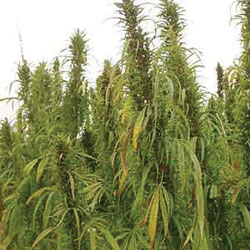 The Hempire Strikes Back
The Hempire Strikes Back
A Jack Herer-inspired initiative is aiming for the 2012 ballot
By Jasen T. Davis
In 2010, Proposition 19 (the Control, Regulate & Tax Cannabis Act) failed to pass, but the final vote showed that only 53.8 percent of the voters had said “no.” With polls indicating that a greater majority of Californians approve of legalizing the plant every day, all it could take is one more bill to do the job.
California Cannabis Hemp & Health Initiative 2012 (CCHHI 2012) is another opportunity to legalize cannabis in the next election cycle. Michael Jolson, the chief proponent for the ballot measure, is a political activist from Santa Cruz who was Jack Herer’s right-hand man and top signature gatherer for more than 20 years.
Jolson spoke with CULTURE to tell us more about CCHHI 2012.
How would CCHHI 2012 benefit the state’s economy?
This initiative would benefit the economy in a positive way because it could allow California farmers to grow cannabis hemp for all of the uses it’s good for and generate a trillion-dollar economy. There are up to 10,000 uses for hemp, and thousands of jobs could be created based on California’s new industry.
By 2013, if this initiative was voted into law, California farmers could grow a crop that would be the biggest boon to the economy in recent history. The taxation alone would generate billions of dollars in revenues because it would make [also] cannabis a recreational product.
So if the law passes, cannabis will be regulated like alcohol?
Under Herer’s initiative, cannabis would be legal and taxed like wine. That would open the door to “Hemp Bars,” for instance.
How would it benefit collective owners and growers?
Our campaign is trying to appeal to both owners and growers. This would allow the collective owners an opportunity to legally operate a medical facility. They’d be able to sell hemp oil and other products because they would have legal access to those products. This would give them a wider inventory to profit from.
The growers would be protected by this initiative because for a few thousand dollars they could operate as unlimited commercial producers–as if they were growing grapes in a vineyard for wine.
Would this initiative change things for medical cannabis patients?
Everyone in California, under this initiative, could simply pay to become a commercial producer and grow plants, while patients could still have access to their meds the way they do now.
This also allows the local farmer to compete against the larger corporations who want to get in on the business. We want the farmer to become a commercial producer without having to go through so much of a hassle, so we are really aiming making it very affordable.
Do you think growers in NorCal will vote for CCHHI 2012?
We’ve been trying to appeal to growers up north. Sure, there are some who are against legalization, but most growers whole-heartedly want to operate legally, they just don’t want the whole industry to be taken over by big corporations.
Once it’s legalized they’ll be able to expand their operations and have a lot of different business opportunities beyond what they’re doing now. Yes, there will be more competition from other new businesses beyond the club owners, but there will also be more customers as the California economy booms.
I think this would open up the Emerald Triangle to be the Napa Valley of California for hemp. The best cannabis is grown there, and they would become the new epicenter for cultivation.
Fibergrass
Hemp has a long and storied history. Hemp textiles had begun in Europe and Asia as early as 8,000 BCE. According to tradition, Gautama Buddha subsisted on hemp seed. In 450 BCE, Greek scholar Herodotus documented the Scythians making linens from hemp. And by 100 BCE, the Chinese had invented paper made from hemp.









